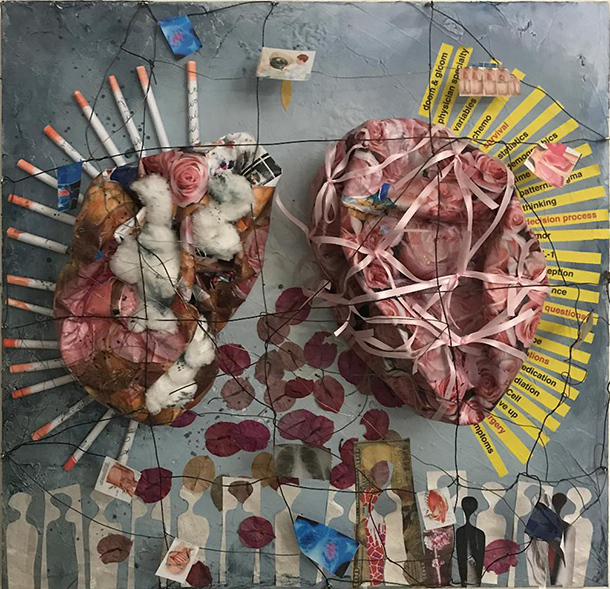A stylized demon is poised to pluck out the eye of his victim. A mixed-media bust sports a headdress of layers that tumble playfully upwards in bursts of blue. On video, a couple dances the tension as a man tries to close himself off from his female partner’s reproductive health. These are all part of Artist & Researcher 3, a collaboration between 16 local artists and 16 Keck Medicine of USC medical researchers as a part of the Keck School of Medicine’s HEAL (Humanities, Ethics, Art, and Law) Program.
Ted Meyer, a longtime artist and curator, is HEAL’s artist in residence. Since 2016, he has curated several exhibits each year that align the work of artist patients with the school’s core curriculum. Pamela Schaff, MD, associate professor of clinical family medicine at the Keck School and director of HEAL, explained:
“Through generous funding continued by Dean Laura Mosqueda, we were able to recruit Ted, and our collaboration has really enriched our campus community. Our students, faculty, and staff learn about the patient’s experience of illness through engagement with their artwork.”
Meyer has always been interested in the intersection of science and art.
“I used to love when my copy of Popular Science showed up in the mail when I was a kid, and I was always interested in how artists depicted the scientific research they were highlighting. Also, I have a rare genetic illness. I had given bone marrow at NIH when I was 5 for a treatment that didn’t come online until I was 42. I know the researchers do work that can be years in scope without much recognition. I wanted to give them a little credit and a bit of the spotlight.”
Meyer proposed the Artist and Researcher collaborative show to Schaff, who loved the idea. “We put out a call for biomedical research scientists who might be interested in speaking to an artist about imagining their work for display in the Hoyt Gallery,” she said. “The first show in April 2017 was a stunning success.”
Meyer’s core idea behind the Artist & Researcher series is making advancements in medical research more accessible to the general public. “Maybe it’s easier for a layperson to see some art and grasp a concept rather than having to read a complex paper.”
Elizabeth David, MD, associate professor of clinical surgery at the Keck School, collaborated with contemporary visual artist Karrie Ross. David’s research focuses on how social stigmas about lung cancer can affect both patients and the physicians who treat them: Patients may avoid seeking treatment because of shame, and physicians may be unconsciously influenced by the common misconceptions that lung cancer only comes from smoking, or that lung cancer is untreatable.
“I wanted to participate in the event because any opportunity to talk about lung cancer and create a positive message helps lung cancer patients,” David said. “I thought that collaborating with an artist who could help make a visual representation of my ideas and research would be helpful to starting these conversations.”
Both women found the collaborative process rewarding:
“It was very interesting to see how Karrie listened to me and then made my thoughts come to life. Sometimes it is hard to turn thoughts into words that make sense and she was able to do it with imagery,” David said.
“I found Dr. David’s research very important,” Ross said. “And with the added interest that my father died from complications of lung cancer back in 1989, I felt we were a good match. When we discussed the project back in February, I left with two pages of notes and several print-outs to reference. I’m a listener and most of what I put into the art is from the listening.”
The result was The Lung Is Pink, an intriguing mixed media piece about dispelling preconceived notions that hits the mark right between ominous and playful.
Viewers currently can see the whole collection at the Hoyt Gallery, and USC community members and friends are welcome to attend a reception celebrating the show from 5-8 p.m. April 23.
The Hoyt Gallery is located at 1975 Zonal Ave, Los Angeles, CA 90033 in the basement of the Keith Administration Building on the Health Sciences Campus.
— Lex Davis


